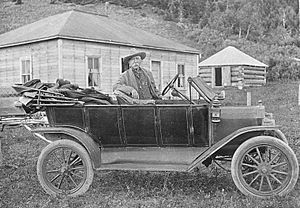Kootenay Brown facts for kids
Quick facts for kids
Kootenay Brown
|
|
|---|---|
 |
|
| Born |
John George Brown
10 October 1839 Ennistymon, County Clare, Ireland
|
| Died | July 18, 1916 (aged 76) Waterton Lakes, Alberta, Canada
|
| Resting place | Waterton Lakes, Alberta, Canada |
| Citizenship | British, Canadian |
| Occupation |
|
| Employer | British government, Canadian government, self-employed |
| Known for | Being a famous mountain men on the Canadian and American Western Frontier |
| Spouse(s) | two wives; Metis wife and ? |
| Military career | |
| Allegiance | United Kingdom |
| Service/ |
|
| Years of service | 1857–1862 |
| Rank | commissioned officer |
| Unit | King's 8th Regiment of Foot |
John George Brown (born October 10, 1839 – died July 18, 1916) was an amazing adventurer. He was better known as "Kootenai" Brown. Born in Ireland, he became a soldier, trader, explorer, and a big supporter of protecting nature in Canada. He was known for his many skills and his love for the outdoors.
Early Life and New Beginnings
John George Brown was born and grew up in Ennistymon, a town in County Clare, Ireland. When he was 18, in 1857, he joined the British Army as an officer. This was a special achievement because he didn't have to buy his position, which was common back then.
He served in India for a few years. But in 1862, he decided to leave the army. He then traveled to British Columbia, Canada. He joined many other people hoping to find gold during the famous Cariboo Gold Rush.
Life as a Frontiersman
Finding gold wasn't easy, and Kootenay Brown didn't strike it rich. So, he tried other ways to make a living. He became a trapper, catching animals for their furs. For a short time, he even worked as a constable, helping to keep order in a place called Wild Horse Creek.
In 1865, he moved to the beautiful Waterton Lakes area. On his way to Fort Garry (which is now the city of Winnipeg), he was injured by a member of the Blackfoot Confederacy. After recovering, he settled in Fort Garry and worked as a trader.
Later, he delivered mail for the United States Army. During this time, in 1869, he was captured by the famous Native American leader Sitting Bull. Luckily, Kootenay Brown was able to escape.
After an argument in Fort Benton, Montana, Kootenay Brown returned to his favorite place, the Kootenays. He became very well-known as a skilled guide and packer. He helped many people explore the wild lands.
Protecting Nature
Kootenay Brown was a strong voice for protecting the environment. He believed it was important to save the beautiful natural areas. In 1895, the Kootenay Forest Reserve was created. This was a big step towards conservation.
Because of his dedication, Brown became a fishery officer. This meant he helped protect the fish and rivers. In 1910, he became a forest ranger, working to protect the forests.
He lived long enough to see the Kootenay Forest Reserve grow even bigger. It became Waterton Lakes National Park in 1914. This park even connected with Glacier National Park in Montana, creating a huge protected area.
Family Life
In 1869, Kootenay Brown married a local Metis woman. The Metis people are a unique group with mixed Indigenous and European heritage. Together, they made a living by hunting bison and wolves.
Death
Kootenay Brown passed away on July 18, 1916, in Waterton Lakes, Alberta, Canada. He was buried there, alongside his two wives. His legacy lives on through the beautiful parks he helped create and protect.
 | Sharif Bey |
 | Hale Woodruff |
 | Richmond Barthé |
 | Purvis Young |

